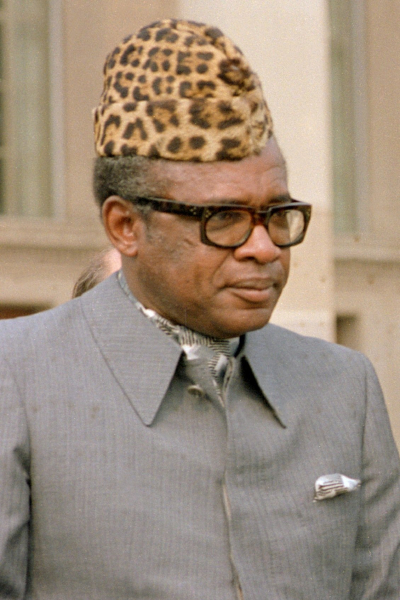The Republic of the Congo (French: Rpublique du Congo) was a sovereign state in Central Africa, created with the independence of the Belgian Congo in 1960. From 1960 to 1966, the country was also known as Congo-Lopoldville (after its capital) to distinguish it from its northwestern neighbor, which is also called the Republic of the Congo, alternatively known as "Congo-Brazzaville". In 1964, the state's official name was changed to the Democratic Republic of the Congo, but the two countries continued to be distinguished by their capitals; with the renaming of Lopoldville as Kinshasa in 1966, it became also known as Congo-Kinshasa. After Joseph Dsir Mobutu, renamed Mobutu Sese Seko in 1972, commander-in-chief of the national army, seized control of the country, it became the Republic of Zaire in 1971. It would again become the Democratic Republic of the Congo in 1997. The period between 1960 and 1964 is referred to as the First Congolese Republic.
Mobutu Sese Seko Kuku Ngbendu Wa Za Banga (; born Joseph-Désiré Mobutu; 14 October 1930 – 7 September 1997) was a Congolese politician and military officer who was the President of the Democratic Republic of the Congo from 1965 to 1971, and later Zaire from 1971 to 1997. He also served as Chairman of the Organisation of African Unity from 1967 to 1968. During the Congo Crisis, Mobutu, serving as Chief of Staff of the Army and supported by Belgium and the United States, deposed the democratically elected government of left-wing nationalist, Patrice Lumumba in 1960. Mobutu installed a government that arranged for Lumumba's execution in 1961, and continued to lead the country's armed forces until he took power directly in a second coup in 1965.
To consolidate his power, he established the Popular Movement of the Revolution as the sole legal political party in 1967, changed the Congo's name to Zaire in 1971, and his own name to Mobutu Sese Seko in 1972. Mobutu claimed that his political ideology was "neither left nor right, nor even centre", though nevertheless he developed a regime that was intensely autocratic even by African standards of his time. He attempted to purge the country of all colonial cultural influence through his program of "national authenticity". Mobutu was the object of a pervasive cult of personality. During his rule, he amassed a large personal fortune through economic exploitation and corruption, leading some to call his rule a "kleptocracy". He presided over a period of widespread human rights violations. Under his rule, the nation also suffered from uncontrolled inflation, a large debt, and massive currency devaluations.
Mobutu received strong support (military, diplomatic and economic) from the United States, France, and Belgium, who believed he was a strong opponent of communism in Francophone Africa. He also built close ties with the governments of apartheid South Africa, Israel and the Greek military junta. From 1972 onward, he was also supported by Mao Zedong of China; mainly, due to his anti-Soviet stance, but also as part of Mao's attempts to create a bloc of Afro-Asian nations led by him. The massive Chinese economic aid that flowed into Zaire gave Mobutu more flexibility in his dealings with Western governments, allowed him to identify as an "anti-capitalist revolutionary", and enabled him to avoid going to the International Monetary Fund for assistance.By 1990, economic deterioration and unrest led Mobutu to agree to share power with opposition leaders, but he used the army to thwart change until May 1997, when rebel forces led by Laurent-Désiré Kabila overran the country and forced him into exile. Already suffering from advanced prostate cancer, he died three months later in Morocco. Mobutu was notorious for corruption, nepotism, and the embezzlement of between US$4 billion and $15 billion during his rule. He was known for extravagances such as shopping trips to Paris via the supersonic and expensive Concorde.

1965Nov, 24
Joseph-Désiré Mobutu seizes power in the Democratic Republic of the Congo and becomes President; he rules the country (which he renames Zaire in 1971) for over 30 years, until being overthrown by rebels in 1997.
Choose Another Date
Events on 1965
- 8Mar
Vietnam War
Thirty-five hundred United States Marines are the first American land combat forces committed during the Vietnam War. - 15Mar
Voting Rights Act
President Lyndon B. Johnson, responding to the Selma crisis, tells U.S. Congress "We shall overcome" while advocating the Voting Rights Act. - 6Aug
Voting Rights Act of 1965
US President Lyndon B. Johnson signs the Voting Rights Act of 1965 into law. - 27Nov
Lyndon B. Johnson
Vietnam War: The Pentagon tells U.S. President Lyndon B. Johnson that if planned operations are to succeed, the number of American troops in Vietnam has to be increased from 120,000 to 400,000. - 28Nov
Ferdinand Marcos
Vietnam War: In response to U.S. President Lyndon B. Johnson's call for "more flags" in Vietnam, Philippine President-elect Ferdinand Marcos announces he will send troops to help fight in South Vietnam.

 English
English  español
español  français
français  português
português  русский
русский  العربية
العربية  简体中文
简体中文 